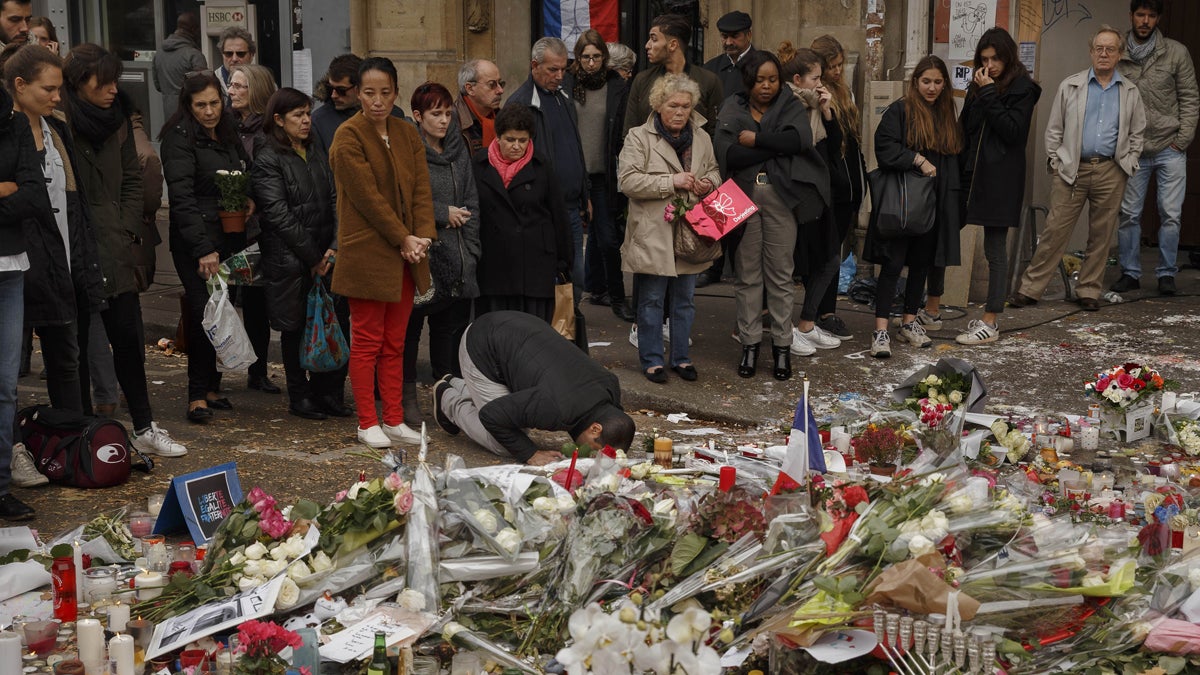City of Light dimmed by terrorism but not diminished

A Muslim, center, prays in front of a floral tributes near the Bataclan concert hall after the terrorist attacks in Paris, Monday, Nov. 16, 2015. France is urging its European partners to move swiftly to boost intelligence sharing, fight arms trafficking and terror financing, and strengthen border security in the wake of the Paris attacks. (AP Photo/Daniel Ochoa de Olza)
I admit it. I had grown numb to reports of daily violence. The school shootings. Children caught in the crossfire of North Philly drug wars. Even the recent plane bombing in the Sinai. These senseless murders happen with such frequency, the evening news might be a loop tape. But when the entire city of Paris was terrorized, something inside me broke open.
I know Paris. Its distinct neighborhoods, its outdoor creperies, its beguiling aromas, its Métro. I have been going there since 1967, pulled back each time by the desire to discover yet another dimension of the most beautiful city in the world.
Is that a cliché? Probably. But that doesn’t make it any less true. Paris architecture, its majestic boulevards and the charm of its narrow cobblestone streets have been likened to Philadelphia. Especially the Ben Franklin Parkway. But what’s missing here is the reverence for a perfectly baked baguette, a scarf knotted just so, and a culture that requires — demands — saying “Bonjour” before asking a shop owner if they have an item in your size.
To understand the attack in Paris, I need to go back to my first visit. I arrived there with only one French phrase committed to memory from my high school class. “He wants to follow a road that leads to glory.” Personally, I just wanted to have my first meal in a Parisian restaurant on the Left Bank. I studied the menu, and bravely ordered some kind of beef, potatoes, a beverage and a dessert. When the waitress brought me a burger, French fries, a Coke and apple pie, I was sure she was mocking me. But who knows? Perhaps that’s what I ordered.
The Paris of that time was nothing like today. There were no sprawling low-income suburbs filled with refugees from the Middle East and Africa. But there was political unrest. In May 1968, 20,000 students from the Sorbonne and University of Paris led a strike that closed down the entire city and, eventually, the nation. They were soon joined by a national strike of 11 million workers. While my American peers protested the war in Vietnam, Parisian students protested against capitalism, consumerism and class discrimination in French society.
The American love affair with Paris has had its quarrels. In 2003, when the U.S. invaded Iraq, the animosity was so strong that friends suggested I wear a Canadian pin on my lapel when I went there. I was incapable of hiding my nationality. Everything gave me away. My voice. My clothes. The way I hold a fork.
And yet I never encountered the antagonism I had expected. People smiled as I stood in line at the corner boulangerie for my first coffee and croissant of the day. Shopkeepers returned my bonjours graciously. Waiters had no problem serving me, and my hotel concierge invited me join her at a charming nightclub I never would’ve discovered on my own.
One night, I took a taxi. The elderly driver was listening to a French radio program. The only words I could make out were “Sharon and Arafat.” Using my rudimentary French, I asked what the program was about. He told me it was an Israeli news program.
“I am a Tunisian Jew,” he explained.
“Je suis une Juif américain,” I answered.
He turned in his seat and extended his hand.
“I love America!” he said.
A simple exchange. One that broke down stereotypes, fears and assumptions.
When I returned to Paris in 2011, it was OK to be an American, as long as you knew where you were going. I had visited artist friends who lived in the 9th Arrondisement and had stayed later than planned. When it was time to walk to the Métro, my friend’s husband insisted on accompanying me to the platform.
“That’s not necessary,” I said. “I ride the subway in Philly and New York all the time.”
“This is different,” he said. “This particular Métro stop is Barbes. It is at the intersection of three arrondisements, and some of them are very bad.”
“Very bad” was code for poor African and Arab refugees, the ones most likely to rob tourists such as me. The subway doors opened. This wasn’t the Paoli Local. Or even the Frankford El. I assumed my best Rocky Balboa impersonation and swaggered my way to a seat. If anyone so much as touched me, I was prepared to yell the kind of profanity that makes Phillies games so much fun. Nothing happened. Fears and assumptions.
Following the attack last weekend, a Parisian friend sent me a photo of Jewish and Muslim religious leaders praying together at a memorial for the victims outside the Bataclan theater, where the worst massacre on Friday took place. That speaks to me of the unique moral character of the people of Paris.
Yes, Paris has changed. You are as likely to hear Arabic, Hebrew or Swahili in the streets as French, Spanish or English. And the city is as vibrant and vital as always. In America, we live to work. To attain wealth, power and security. In Paris, they live to celebrate the human spirit. During these troubling days, I am thinking about the darkness that has befallen the City of Light and what can be done to turn the lights back on again.
WHYY is your source for fact-based, in-depth journalism and information. As a nonprofit organization, we rely on financial support from readers like you. Please give today.

